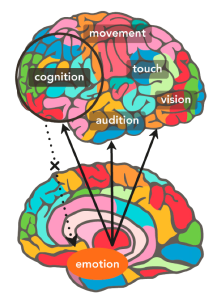Toxic work environments are despised by all, yet programs and good intentions don’t seem to make a difference. As it turns out, positive relationships serve as the bedrock in companies with thriving cultures. Discover exactly why below:
Thanks to science, we can understand our mindset and how to shift to a more positive stance during times of stress. From a biological standpoint, the amygdala, known as the primitive brain and the center of emotions, has the ability to control all other parts of the brain, including the prefrontal cortex.
While the survival aspects are well understood, in interactions with others, our emotions drive us to act in ways that may be against our better judgment, creating disconnections with those that matter to us. Conversely, our logic center (prefrontal cortex) does not have direct control over our amygdala thus, we cannot simply use logic or judgment to feel positive emotions.

Attachment theory informs us that, from birth, we adapt to our surroundings and learn to create attachments, which continue into adulthood. We are social creatures who cannot thrive in isolation. When we experience disconnections, the brain goes into a panic, causing us to experience a flurry of emotions. This often results in a negative cycle of interactions that damage our relationships.
To avoid falling into this cycle, we need to understand the importance of emotions and attachments.
The people we depend on at work are interpreted by our brains as attachment figures thus, our emotional responses to them are strong and impactful. Emotional connection, as envisioned by EmC Leaders, brings neurobiology and attachment theory into alignment, allowing us to learn the language of emotions and articulate emotional responsiveness.
By tuning into each other’s emotions at work, respecting the emotional state each person is in, and creating a safe environment for people to express their emotions, we interrupt the brain’s immediate panic responses and engage effortlessly in a process of positive interactions. We turn toxic environments into healthy workplaces which become productive and engaging.
We use science to help guide our methods. We understand the deeper nuances between our brains and our emotions and use this knowledge to our advantage.
Want to learn more? Connect with us today to set up a no-commitment conversation about the EmC Strategy and how this art of understanding emotion can positively impact the success of your team.